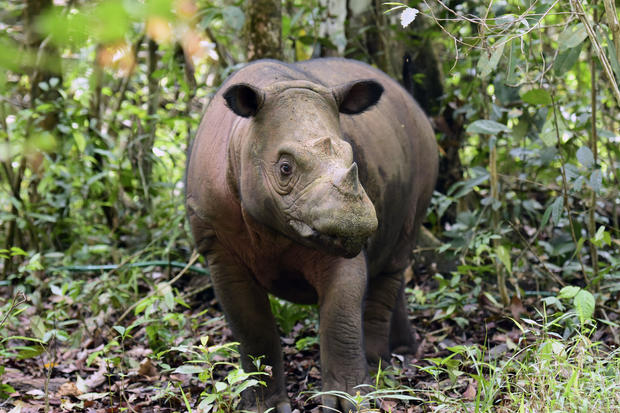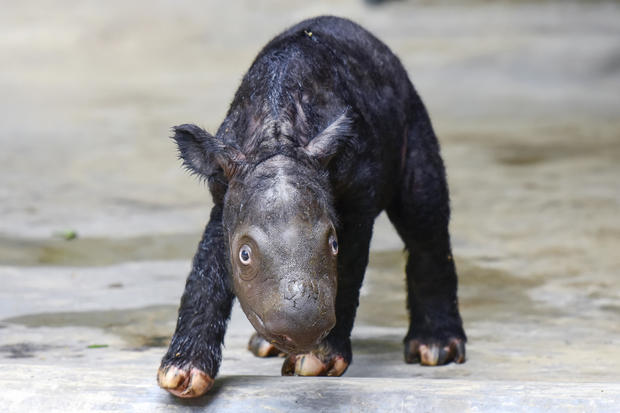A critically endangered Sumatran rhino was born in Indonesia's western island of Sumatra on Saturday, the second Sumatran rhino born in the country this year and a welcome addition to a species that currently numbers fewer than 50 animals.
A female named Delilah gave birth to a 55-pound male calf at a sanctuary for Sumatran rhinos in Way Kambas National Park in Lampung province, at the southern tip of Sumatra island.

The calf is fathered by a male named Harapan, who was born at the Cincinnati Zoo in 2006. He was the last Sumatran rhino in the world to be repatriated to Indonesia, meaning that the entire population of Sumatran rhinos is now in Indonesia.
Delilah, the mother rhino who recently gave birth to her offspring at the Sumatran Rhino Sanctuary in Way Kambas National Park (TNWK), is a history maker! Delilah, at the age of 7 years, 6 months, and 13 days, gave birth to a male rhino. She was born from the union of rhinos Ratu and Andalas at the SRS TNWK in 2016. The name "Delilah" was bestowed by President Joko Widodo on July 27, 2016.
Various interpretations arose regarding this naming. "Whatever the interpretation, Delilah has proven herself to be a strong and blessed female rhino, as the birth of her offspring occurred in the wild, not in a captive breeding facility (boma), without the intervention of veterinary teams or wildlife keepers," expressed Hermawan, Acting Head of TNWK. Hermawan explained that Delilah's pregnancy could be considered quite miraculous compared to other female rhinos in TNWK. With just one mating with the male rhino Harapan, Delilah immediately became pregnant and gave birth to a male rhino on Saturday (25/11).

According to Dr. Zulfi Arsan, the Coordinator of Veterinary Doctors at SRS TNWK, there was an interesting occurrence when it was first discovered that Delilah had given birth. Around 08:19 AM WIB, Edi Parwito, affectionately known as Parlan, Delilah's rhino keeper, reported that Delilah had given birth in the forest.
"After confirming that the newborn alongside Delilah was indeed a rhino calf, the veterinary team headed to the location. Parlan also conveyed that Delilah's offspring is male and in good condition, staying close to its mother," explained Zulfi. Hermawan added that the birth of Delilah's rhino calf indicates that the future of Sumatran rhino conservation lies in Indonesia, specifically in Way Kambas National Park.
Sumatran Rhino, Endangered
The Sumatran rhinoceros, one of the most critically endangered species on the planet, faces numerous challenges that threaten its survival. Delilah's recent successful birth holds immense significance in the context of preserving this majestic species. The Sumatran rhino, distinguished by its distinctive hairy appearance, is the smallest of the living rhinoceros species and the only Asian rhino with two horns.
However, their numbers have drastically declined due to various factors including habitat loss, illegal poaching for their horns which are falsely believed to have medicinal value, and a fragmented population. Delilah's birthing process in the wild is a rare event, highlighting the resilience and natural instincts of this species. Her ability to conceive with minimal intervention sets a remarkable precedent for the conservation of Sumatran rhinos.
Way Kambas National Park in Indonesia has been a key location for the protection and breeding of these rhinos. Efforts by conservationists and dedicated teams aim to increase the population of this critically endangered species through controlled breeding programs and habitat preservation. The birth of Delilah's male calf not only signifies hope but also emphasizes the importance of sustained conservation efforts.
The role of caretakers and veterinary teams, like Dr. Zulfi Arsan and Edi Parwito (Parlan), is crucial in monitoring and ensuring the well-being of both mother and calf. It's vital to recognize that the survival of the Sumatran rhino is deeply intertwined with preserving its natural habitat. Way Kambas National Park serves as a sanctuary not only for these rhinos but also for various other endangered species. Scientists and conservationists continue to explore innovative methods to protect these rhinos, including advanced reproductive technologies to aid breeding programs and genetic diversity.
Delilah's story serves as a beacon of hope amid the looming threat of extinction for the Sumatran rhino. It emphasizes the significance of global cooperation, heightened conservation efforts, and public awareness in safeguarding these incredible creatures for future generations.



















